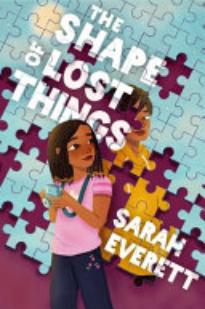Review of The Shape of Lost Things
 The Shape of Lost Things
The Shape of Lost Things
by Sarah Everett
Middle School Harper/HarperCollins 272 pp.
10/24 9780063256613 $18.99
e-book ed. 9780063256620 $9.99
When Skye was six years old, her parents, both physicists, divorced. She and her brother, Finn, spent alternate weekends with their dad, but he became increasingly obsessed with physics and would forget to feed and interact with the kids, leaving them to fend for themselves. When the book opens, Skye (now twelve), her mother, and her mother’s kind boyfriend are celebrating Finn’s “MIA birthday,” because Finn was kidnapped by their father and has been missing for four years. Miraculously, he is found soon after and returns home: “And then he’s there. A tall Black boy with short, tiny dreads, fat headphones looped around his neck. Finn. My brother. My Finn.” Skye is excited that her brother is back, but she realizes that the boy who has returned is a different person. This Finn is “so sad and lost, like he carries so much pain inside”; rather than accept the fact that her brother has changed, Skye believes that he is an imposter, whom she calls “Not-Finn.” Skye must come to terms with some tough and tangled truths, including admitting to herself that she feels rejected because her father didn’t kidnap her. This engaging coming-of-age story gives voice to complicated and traumatic feelings caused by divorce and estrangement, to changes in family and friendships, and to the difficulty of accepting the inevitability of change.
From the January/February 2025 issue of The Horn Book Magazine.

ALREADY A SUBSCRIBER? LOG IN
We are currently offering this content for free. Sign up now to activate your personal profile, where you can save articles for future viewing.







Add Comment :-
Be the first reader to comment.
Comment Policy: